高中英语句子翻译与写作-第6章-虚拟语气
高考英语作文虚拟语气运用
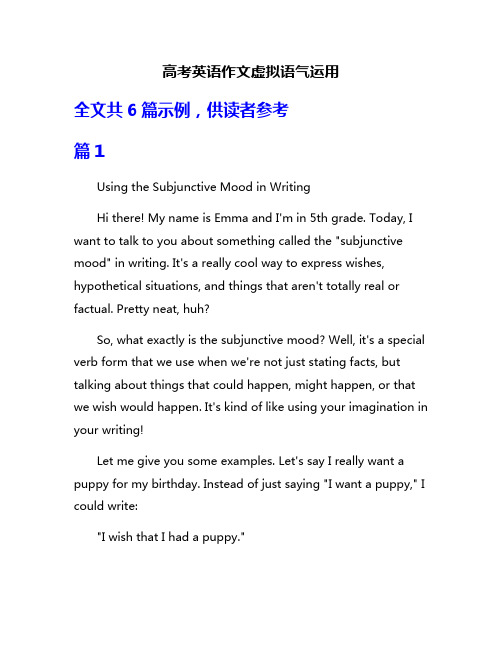
高考英语作文虚拟语气运用全文共6篇示例,供读者参考篇1Using the Subjunctive Mood in WritingHi there! My name is Emma and I'm in 5th grade. Today, I want to talk to you about something called the "subjunctive mood" in writing. It's a really cool way to express wishes, hypothetical situations, and things that aren't totally real or factual. Pretty neat, huh?So, what exactly is the subjunctive mood? Well, it's a special verb form that we use when we're not just stating facts, but talking about things that could happen, might happen, or that we wish would happen. It's kind of like using your imagination in your writing!Let me give you some examples. Let's say I really want a puppy for my birthday. Instead of just saying "I want a puppy," I could write:"I wish that I had a puppy."See how I used "had" instead of "have"? That's the subjunctive mood right there! By saying "I wish that I had a puppy," I'm not just stating a fact, but expressing a wish or desire for something that isn't currently true.Here's another example. Let's say my friend Jenny and I are planning a camping trip, but we're not sure if it will rain or not. I could write:"If it were to rain, we would have to cancel our camping trip."Again, I used "were" instead of "was" because I'm talking about a hypothetical situation – something that might happen, but hasn't happened yet.Isn't that cool? It's like you're bending the rules of regular writing a little bit to talk about things that aren't totally real or factual. It makes your writing more interesting and expressive!Now, let me share some more examples of how we can use the subjunctive mood in our writing:Expressing wishes:"I wish that I were taller.""If only I had a million dollars!"Talking about hypothetical situations:"If I were the President, I would make ice cream free for everyone.""If she studied harder, she would get better grades."Giving suggestions or advice:"It would be better if you left early to avoid traffic.""I recommend that he practice more before the game."Expressing necessity or obligation:"It is essential that we arrive on time.""It is imperative that he follow the rules."See how cool it is? With the subjunctive mood, you can make your writing more lively, imaginative, and expressive. It's like you're opening up a whole new world of possibilities!So, the next time you're writing a story, an essay, or even just a journal entry, try sprinkling in some subjunctive mood magic. It'll make your writing stand out and show off your awesome language skills!Alright, that's all I have to say about the subjunctive mood for now. Writing this essay has been a blast, and I hope youlearned something new and exciting! Keep practicing, keep exploring, and most importantly, keep having fun with writing!篇2The Magical World of "What If"Hi there! My name is Lily, and I'm a 10-year-old girl who loves learning about the English language. Today, I want to share with you something really cool that I learned in my English class – the subjunctive mood!Now, I know what you might be thinking, "Mood? Isn't that just about feelings?" Well, in grammar, a mood is a way of expressing the verb's attitude towards the action or state it describes. And the subjunctive mood is all about exploring the world of "what if" and imagining things that aren't necessarily true or real.Let me give you an example. Imagine if your teacher said, "I wish I were a bird so I could fly away from all these homework assignments!" Now, in that sentence, the verb "were" is in the subjunctive mood because it's expressing a hypothetical situation – your teacher isn't really a bird, but they're imagining what it would be like if they were.Isn't that cool? It's like the subjunctive mood opens up a magical door to a world where anything is possible!But wait, it gets even better! The subjunctive mood can also be used to express wishes, desires, and recommendations. For example, your mom might say, "I suggest that you clean your room before your grandparents arrive." In that sentence, the verb "clean" is in the subjunctive mood because it's expressing a suggestion or recommendation.And here's another example: "If I were the principal of this school, I would make recess twice as long!" See how the verb "were" is in the subjunctive mood again, but this time it's part of a hypothetical condition? It's like we're stepping into an imaginary world where I'm the principal and can make all the rules!Now, I know what you're thinking, "But Lily, isn't the subjunctive mood kind of complicated and hard to use?" Well, you're right – it can be a bit tricky at first. But let me share with you some of the ways I've learned to recognize and use the subjunctive mood:Look for words like "wish," "suggest," "recommend," or "insist" – these often introduce clauses that use the subjunctive mood.Pay attention to hypothetical situations or conditions, like "if I were" or "as though." These usually require the subjunctive mood.Practice, practice, practice! The more you use the subjunctive mood, the more natural it will become.And you know what? Using the subjunctive mood correctly can really make your writing and speaking sound more sophisticated and polished. It's like a secret weapon that can take your English skills to the next level!But don't just take my word for it. Let's look at an example of how the subjunctive mood can make a sentence sound more formal and academic:Without subjunctive mood: "I wish I was a famous author so I can write bestselling books."With subjunctive mood: "I wish I were a famous author so that I might write bestselling books."See how the second sentence sounds a bit more elevated and formal? That's the power of the subjunctive mood!So, next time you're writing an essay or giving a presentation, try sprinkling in a few subjunctive mood constructions. It's agreat way to show off your command of the English language and impress your teachers or audience.And who knows? Maybe using the subjunctive mood will open up a whole new world of "what ifs" and possibilities for you, just like it has for me!篇3Using the Subjunctive Mood in WritingHi there! My name is Timmy and I'm in 5th grade. Today, I want to tell you all about a really cool part of the English language called the subjunctive mood. It's kind of like a special magic way of talking and writing that makes things sound fancier and more imaginative.The subjunctive mood is used when we want to talk about things that aren't real or that haven't happened yet. It's like we're being creative writers or dreamers! Instead of just stating cold hard facts, the subjunctive allows us to explore hypothetical situations, desires, demands, and imaginary worlds.Let me give you some examples so you can see what I mean. Let's say I really really want a puppy for my birthday. I could say to my mom "I want that you buy me a puppy." See how I used"that you buy" instead of "that you will buy"? That's the subjunctive in action!Or let's imagine I'm a wizard casting a spell. I could say "I demand that this frog turn into a handsome prince!" Rather than "this frog turns" or "this frog will turn", I use the subjunctive "turn" to make it more magical and unreal.The subjunctive mood is usually used with certain verbs like want, demand, insist, recommend, suggest. But it can also show up after "if" clauses talking about imaginary conditions. Like "If I were a billionaire, I would buy a private jet."It's kind of the opposite of just stating facts about the real world. Facts are things that are 100% true and concrete. Like "Tommy has a red bicycle." But the subjunctive allows us to explore ideas that are contrary to facts and reality.Another example: "I wish it were sunny outside today instead of rainy." Well, it's a fact that it's rainy, but I'm using the subjunctive "were" to imagine the sunny possibility I desire instead.The subjunctive mood just makes writing sound fancier and more expressive. It's great for poetry, literature, daydreaming,and being dramatic! Let me give you a few more examples from the top of my imaginative 5th grade mind:"The teacher demands that we be quiet during the test.""I suggested that he practice his violin daily.""If I were the president, I would give everybody ice cream every day!""I wish the summer would never end."Pretty cool, right? Playing around with the subjunctive is one of my favorite things about writing. It injects life into plain facts and allows us to explore ideas beyond what's just simply true. Why just state the obvious when you could dream up imaginative new realities?As kids, I think subjunctive mood gives us unlimited freedom in our stories, daydreams, and make-believe adventures. We can conjure any hypothetical scenario we want and share it with the world through writing. It's like having a key to unlocking magical realms of possibility!And you know what's really awesome? Sometimes wishes and hypothetical statements that start in the subjunctive mood can actually come true in real life if we keep dreaming them. Likeif I keep wishing hard enough, maybe my parents really will get me that puppy for my birthday. A kid can dream, can't he?So next time you're writing an imaginative story or even just keeping a diary about your day, try sprinkling in some subjunctive magic. It'll make your words sound sophisticated and unlock a world of "what ifs" right on the page. Who knows, you might just inspire new realities into existence!Well, that's all I've got to say on the subjunctive for now. Let me know if you need any other writing tips from the perspective of a totally elite 5th grade author. I'll be over here practicing my subjunctive and maybe even brewing a spell or two. If I were a real wizard, I would...篇4The Subjunctive Mood is Super Cool!Hi there! My name is Emma and I'm a 4th grader. Today I want to tell you all about the subjunctive mood in English. I know it sounds like a really big fancy term, but it's actually pretty neat once you get the hang of it.The subjunctive is a verb form that we use to talk about imaginary, hypothetical, or non-real situations. It's kind of likemagic words that let you express wishes, suggestions, demands and more! The subjunctive sounds a bit different than the normal verb forms you're used to.For example, if I said "I demand that he goes to the park", that's not using the subjunctive. But if I say "I demand that he go to the park", then I'm using that special subjunctive verb form. See how "go" is different than "goes"? That's the subjunctive in action!There are lots of different situations where we use the subjunctive mood in English. One main use is for demands and requests, like I just showed with "I demand that he go to the park." Some other examples:"I insist that you be quiet during the test.""Mom requires that I do my chores before playing video games."Using "be" and "do" instead of "are" and "does" is the subjunctive form. By using it, it makes the demand or request feel a bit more forceful and serious.The subjunctive is also really common for expressing wishes and desires about something. Like if I say "I wish I were taller", the "were" part is the subjunctive. It's not talking about reality,since I'm not actually taller. I'm just saying what I wish could be true. More examples:"I wish it were sunny outside today.""If only I had rollerblades, then I could rollerblade to school.""I wish my brother wouldn't tease me so much."Using "were" instead of "was", "had" instead of "have", and "wouldn't" instead of "doesn't" are all examples of the subjunctive mood. It's a way to talk about imaginary situations that aren't real.Another fun use of the subjunctive is to make suggestions or give advice. Like a parent might say:"I suggest that you go to bed early tonight.""I recommend that you eat your vegetables.""It's important that you be kind to others."Using verbs like "suggest", "recommend", and "is important" in the subjunctive lets you politely tell someone what you think they should do.There's also something called the subjunctive in conditional sentences when you're talking about hypothetical situations. Like:"If I were President, I would give everyone free ice cream.""If dogs could talk, I bet they'd have funny voices.""I could pass the test if I studied more."Using "were" instead of "was", and "could" or "would" instead of other verb forms is the subjunctive structure for these hypothetical conditionals.As you can see, the subjunctive mood is used in tons of different ways to discuss imaginary, non-real, or hypothetical situations and meanings. At first all the irregular verb forms might look a bit weird and unfamiliar. But once you start using the subjunctive, it becomes second nature! It's a super useful way to express wishes, demands, suggestions and more in English.So keep an eye out for examples of the subjunctive mood. When you see strange verb forms like "were" instead of "was", or "go" instead of "goes", chances are it's an example of the awesome subjunctive in action! Recognizing and using thesubjunctive will make you sound really advanced in your English skills.I hope this gave you a good overview of what the subjunctive mood is and how it works. If I were a teacher, I'd definitely give you an A+ for learning this super cool grammar concept! Let me know if you have any other questions.篇5Certainly! Here is a 2,000-word essay on the use of the subjunctive mood in English compositions for the college entrance examination, written from the perspective of an elementary school student:The Subjunctive Mood and MeGee whiz, do you know what the subjunctive mood is? It's this really weird way of talking that makes you sound like you're from a long time ago, or maybe even from a whole different planet! My teacher, Miss Johnson, has been trying to teach us about using the subjunctive in our writing for the big college test. At first, I thought it was just another one of those awfully boring grammar rules that grown-ups love so much. But the more I learn about it, the more I realize the subjunctive mood is actually kind of cool and fun!Miss Johnson says the subjunctive mood is all about expressing wishes, desires, demands, and imaginary situations. Instead of just stating facts like "I am a kid" or "The sky is blue," you get to use fancier verbs to talk about how you want things to be. It's like having a magic wand made of words that can make the impossible seem possible!One way to use the subjunctive is to talk about wishes and dreams. Like, if I say "I wish I were a superhero," that "were" instead of "was" makes it clear that I'm not actually a superhero (sadly). I'm just imagining or wishing that I could fly around and save the world from evil vegetable villains. Or if I say "I wish it were summer vacation already," I'm not just stating a fact about the current season. I'm expressing my longing and desire for those beautiful, school-free days of summer fun!The subjunctive can also be really handy for giving advice or making suggestions. Miss Johnson is always saying things like "I suggest that you be on your best behavior" or "It's important that you get enough sleep." Using "be" and "get" instead of "are" and "getting" makes her sound very authoritative andteacher-like. It's a subtle way of telling us what we should do without directly ordering us around.But my favorite use of the subjunctive has to be for imagining wild hypothetical situations. Like, what if I said "If I were a dinosaur, I would stomp around and scare all the humans"? See how that "were" instead of "was" transports us to an imaginary world where kids are suddenly massive prehistoric creatures? Or we could say "If he were to discover buried treasure, he would buy a million ice cream cones." Using subjunctive verbs like "were" and "would" lets us pretend and fantasize in the most delightfully unreal ways.At times, trying to remember all the subjunctive verb forms can feel like a huge pain in the butt. Why can't we just use normal verbs like everyone else? But Miss Johnson insists that sprinkling a little subjunctive magic into our writing will make our essays sound much more polished and academic for the college admissions people. She says it shows we've mastered all the nitty-gritty details of proper English grammar.I have to admit, as weird as the subjunctive seems at first, it has definitely grown on me over time. There's something almost poetic about being able to use language to explore imaginary territories and express abstract desires. Plus, throwing in a few subjunctives here and there makes you sound downright sophisticated and wise beyond your years. I can already picturesome hoity-toity college admissions officer nodding approvingly at my skillful subjunctive deployment: "Ah yes, this elementary schooler has quite a refined prose style for one so young!"So I've been practicing using the subjunctive in my daily writing assignments. I'll construct fanciful hypotheticals like "If I were a talking tree frog, I would finally be able to stick out my tongued and catch flies" or "If the faculty were to instate mandatory siesta time, students would be much more chipper and productive in class." Sometimes I even bust out a subjunctive verb in casual conversation, much to the bafflement of my friends. "I demand that you be nice to your baby sister!" I'll exclaim imperiously in the schoolyard.Do I truly understand all the nuances and proper contexts for subjunctive usage? Not really, if I'm being perfectly honest. But I figure篇6The Subjunctive Mood: A Mystical JourneyHi there, folks! It's me, your friendly neighborhood kid, here to take you on a magical adventure through the realm of the subjunctive mood. Now, I know what you're thinking, "Subjunctive mood? That sounds like a fancy-schmancygrown-up thing!" But trust me, it's not as scary as it sounds, and it's actually pretty cool once you get the hang of it.First things first, let's talk about what the subjunctive mood is. Basically, it's a way of expressing things that aren't entirely real or certain. It's like a special language that we use to talk about wishes, hypothetical situations, and things that are contrary to fact. Sounds a bit confusing, doesn't it? Don't worry, I'll break it down for you with some examples.Let's start with wishes. When we wish for something, we use the subjunctive mood. For instance, if I say, "I wish I had a pet dragon," I'm using the subjunctive to express a desire that isn't currently true. In this case, the subjunctive form is "had" instead of "have." Pretty neat, right?Now, let's move on to hypothetical situations. Imagineyou're playing a game with your friends, and you say, "If I were the king, I would make ice cream mandatory for breakfast." In this case, you're using the subjunctive "were" instead of "was" to talk about a situation that isn't real (unless you're secretly a king, in which case, kudos to you!).Lastly, we have things that are contrary to fact. Let's say your friend tells you that they aced their math test, but you know they struggled with it. You might respond with something like, "If thatwere true, pigs would fly." Here, you're using the subjunctive "were" to express doubt about the truth of their statement.Whew, that was a lot of examples, wasn't it? But don't worry, I'm not done yet! There are a few more things you should know about the subjunctive mood.First, it's often used with certain verbs and expressions that require it. For example, phrases like "it is essential that," "it is important that," or "it is necessary that" are typically followed by the subjunctive mood. So, you might say something like, "It is essential that he be on time for the meeting."Additionally, the subjunctive mood is sometimes used in formal writing or in certain fixed expressions. For instance, you might see it in phrases like "God save the Queen" or "long live the king."Now, I know what you're thinking, "That's a lot of rules and exceptions to remember!" And you're right, it can be a bit tricky at first. But don't worry, with practice, it'll become second nature. And trust me, using the subjunctive mood correctly will make your English sound more sophisticated and impressive, especially when it comes to those all-important college entrance exams.So, there you have it, folks! A crash course in the subjunctive mood, straight from the mouth of a kid. Who knew something so fancy could be so much fun? Just remember, when in doubt, embrace the subjunctive and let your imagination run wild. After all, that's what makes language so exciting and magical.Happy writing, and may the subjunctive mood be with you!。
外研版高二下期英语选修6 Module6 Grammar虚拟语气(全)
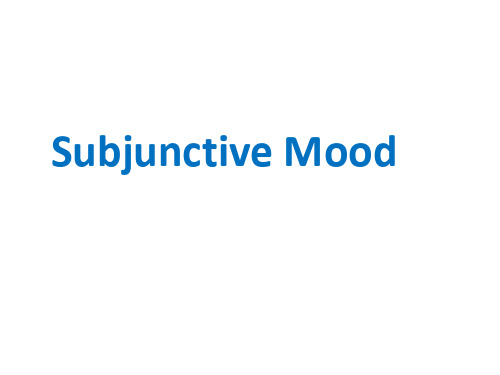
• _H__a__d___they helped us, we would not have failed it.
• (3) If they should come tomorrow, we would finish it.
• _S__h_o__u_l_d_ they come tomorrow, we would finish it.
主句
would do sth should/could/might
would have done sth should/could/might
3.与将来事实相反
did /were
should do sth were to do sth
would do sth should/could/might
注: 虚拟语气中助动词be一律用were,不用was
If we had trained harder,
如果我们训练的更刻苦,
If we hadn’t taken it easy,
如果我们没有放松警惕,
If we hadn’t run out of energy,
如果我们没有筋疲力尽,
We would have won…
我们本来会夺冠,
If we’d been better
注“if”虚拟语气倒装形式的使用: 如果“if”从句中含有 “had ,should 或were ”时, 则可 省 略连词“if ”,而把“had ,should 或were ” 移至主 语之前构成倒装
• (1) If I were you, I would not let her go.
__W___e_r_e__ I you, I would not let her go. • (2) If they had helped us, we would not have
高二英语选修六_名师语法:虚拟语气详解(2)

名师语法:虚拟语气详解(2)概念引入上一单元我们学习了虚拟语气中与现在、将来事实相反的虚拟条件句及宾语从句的虚拟语气。
本单元要继续学习虚拟语气中与过去事实相反的虚拟条件句,及虚拟语气在其它从句中的应用。
首先,我们先看下面含虚拟语气的句子:1. We would have won, if Jack had scored t hat goal.2. We would have won if we hadn’t stayed up so late the night before.3. We would have won the championship, if we had got Mr Han to coach us.4. If she had studied harder, she would have got the diploma.这些句子都是与过去事实相反的虚拟条件句。
下面我们就来学习这部分内容。
用法讲解与过去事实相反的虚拟条件句虚拟条件句的动词形式假设类型条件从句(if从句)谓语动词主句的谓语动词与现在事实相反一般过去式(be用were) would/should/might/could +动词原形与将来事实可能相反1)一般过去式(be只用were)2)were to + 动词原形;3)should + 动词原形would/should/might/could+动词原形与过去事实相反had done would/should/might/could + have 过去分词从表格可知,虚拟条件句与过去事实相反时,条件从句的谓语用过去完成时,而主句的谓语用would/should/might/could加现在完成时形式。
If he had taken my advice, he would not have made such a mistake.如果他听我的劝告的话,就不会犯这样的错误了。
人教版选修六 虚拟语气

比较3:
过去vs.过去完成 If he bought the book yesterday, he had no money left for lunch. (真实条件句) If he had bought the book yesterday, he would have had no money left for lunch. (虚拟条件句)
虚拟语气(the Subjunctive Mood) 是用来表示说话人所说的话不是事 实,而是主观愿望、假使、建议、 推测、纯粹的空想等。
虚拟语气可用于条件句和其它 一些从句中。虚拟语气用于条件句中 的情况较复杂, 所以要特别加以注意。 首先,要判断一下是否该用虚拟语气, 因为条件句有两种, 一种是真实条件 句, 一种是非真实条件句, 只有在非 真实条件句中才用虚拟语气, 在真实 条件句中, 要用陈述语气。
If Had you you had gone to the oncert yesterday, gone to you would have met her.
If it should rain tomorrow, the meeting Should it rain would be put off.
Task 1
忆一忆
Translate some sentences into Chinese 1.If you were an artist, what kind of pictures would you paint?
2. If the rules of perspective had not been discovered, no one would have been able to paint such realistic pictures.
高中英语虚拟语气知识点总结精华(附答案)

高中英语虚拟语气知识点总结精华(名师总结必考语法知识点)第一节语气英语的动词一般可带有三种不同的语气:陈述语气,祈使语气和虚拟语气。
不同的语气用动词的不同形式(有的还借助句法形式)来表示。
第二节虚拟语气的概念虚拟语气是一种特殊的动词形式,一是用来表示说话人所说的话不是一个事实,而是一种假设、猜测、怀疑等(在条件从句中或让步状语从句中);一是表示说话人的愿望、要求、命令、建议等(在宾语从句、表语从句、同位语从句)。
它能实现下列交际功能:a.用来表达一个假设或纯粹的意愿(这种假设或意愿在多数情况下是与事实相反或不太可能实现的。
b. 经常用来缓和语气,使之更加委婉、礼貌、得体,使句子带有推测性和尝试性。
c. 表示烦恼、不耐烦等情绪。
d. 表示适度的责备或批评。
e. 表示美好的祝愿或祝福。
学习虚拟语气在条件句中的用法之前我们必须清楚条件句的种类:条件句有真实条件句与非真实条件句(或称虚拟条件句)两种。
真实条件句所表的假设是可能发生或实现的,句中的条件从句与结果主句都用陈述语气。
如:If it doesn’t rain tomorrow, I wi ll go for a picnic. 假若明天不下雨,我就去野餐。
Oil floats if you pour it on water. 你如把油倒在水里,油就浮起来。
虚拟条件句所表的假设则是不可能或不大可能发生或实现的,句中的条件从句与结果主句皆须用虚拟语气。
第三节虚拟语气在条件句中NOTE:使用虚拟条件句要注意的几点:1.当条件状语从句表示的行为和主句表示的行为所发生的时间不一致时,被称为:错综时间条件句“,动词的形式要根据它所表示的时间作出相应的调整.If you had followed my advice , you would be better now.如果你听我的建议,你现在就会痊愈了.2.在条件句中,可省略if,把were ,had, should 提到句首,变为倒装句式.(后面详细讲解)If you had come earlier, you would have met him.Had you come earlier, you would have met him.1. 与现在事实相反的虚拟条件句,条件从句的谓语用动词的过去式(be的过去式用were), 主句的谓语用should (would, might,could)+动词原形。
高中英语虚拟语气知识点总结
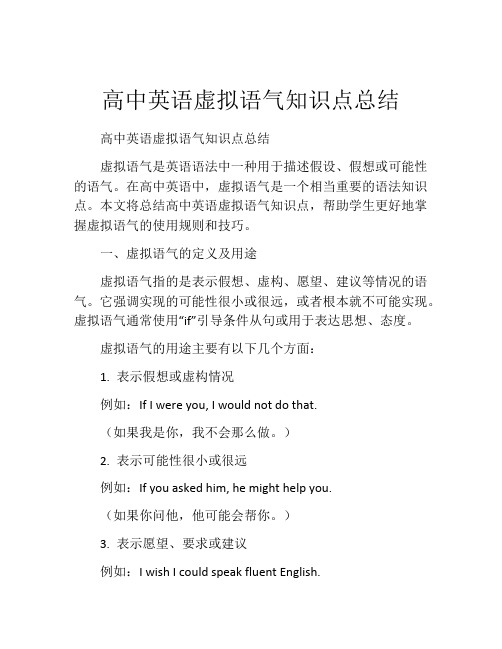
高中英语虚拟语气知识点总结高中英语虚拟语气知识点总结虚拟语气是英语语法中一种用于描述假设、假想或可能性的语气。
在高中英语中,虚拟语气是一个相当重要的语法知识点。
本文将总结高中英语虚拟语气知识点,帮助学生更好地掌握虚拟语气的使用规则和技巧。
一、虚拟语气的定义及用途虚拟语气指的是表示假想、虚构、愿望、建议等情况的语气。
它强调实现的可能性很小或很远,或者根本就不可能实现。
虚拟语气通常使用“if”引导条件从句或用于表达思想、态度。
虚拟语气的用途主要有以下几个方面:1. 表示假想或虚构情况例如:If I were you, I would not do that.(如果我是你,我不会那么做。
)2. 表示可能性很小或很远例如:If you asked him, he might help you.(如果你问他,他可能会帮你。
)3. 表示愿望、要求或建议例如:I wish I could speak fluent English.(我希望我能说流利的英语。
)二、虚拟语气的形式虚拟语气形式主要有以下几种:1. 虚拟语气的过去式:在虚拟语气中,一般用过去式来表示对现在或未来的虚拟。
例如:If I had more time, I would read more books.(如果我有更多时间,我就会多看书。
)2. 虚拟语气的过去完成式:过去完成式用于表示“如果过去已经发生了某些事情,结果会是怎样”。
例如:If I had studied harder in high school, I would have gone to a better college.(如果我在高中时学习更努力,我就能进入更好的大学。
)3. 虚拟语气的“would + 动词原形”形式:“would +动词原形”形式通常用于表示愿望、要求、建议或者可能性。
例如:I wish you would stop smoking.(我希望你戒烟。
)If you would like to come, you are welcome.(如果你愿意来,欢迎你。
高中英语虚拟语气(绝对全)

If my brother were here, everything would be all right. 要是我哥哥在这儿,一切都没问题虚拟语气表示所说的话只是一种主观愿望、假设或建议等。
虚拟语气的重点是:虚拟语气的特殊形式,即用来表示要求、建议、命令、提议、意愿等的主语从句、宾语从句、表语从句和同位语从句中的虚拟形式,含蓄条件句中的虚拟语气和表示愿望的虚拟形式等。
(一)虚拟语气的常见句型●与现在事实相反的虚拟语气与现在相反的虚拟语气的结构为:条件句动词为were或动词的过去式,主句为would/should/could/might+动词原形了。
If you had taken my advice,you wouldn't (couldn’t) have failed in the exam. 如果你按●与过去事实相反的虚拟语气与过去相反的虚拟语气的结构为:从句用had+过去分词,主句用would/should/could/might+have done照我的建议去做,你一定不会(不可能)考试不及格。
●与将来事实相反的虚拟语气If it were Sunday tomorrow, I should (would,could,might) go to see my grandmother. 与将来相反的虚拟语气的结构为:从句谓语动词为动词过去式或“should+动词原形”或“were to+动词原形”,主句为would/could/might +动词原形如果明天是星期天,我就(可能)去看望我奶奶。
If it were to snow this evening, they would not go out. 如果今晚下雪,他们将不出去了。
●省略if形式的虚拟语气有时条件从句中的动作和主句中的动作发生的时间不一致(表示错综时间的虚拟语气),省略连词if。
在书面语中,如果虚拟条件从句中有were,had 或should,可以把if省略,把这几个词放到主语之前,构成主谓倒装。
高中英语 高二英语 选修6 虚拟语气

1 If条件句中的虚拟语气 Subjunctive Mood In If-clauses
Subjunctive Mood In If-clauses
时间 与 现在事 实相反
与 过去事 实相反
if 条件句谓语
主句 谓语
动词过去式
would/could/might/should
(be动词用were) +动词原形
time. = Without your help, I couldn’t have finished my work on time. = But for your help, I couldn’t have finished my work on time.
含蓄虚拟条件句指的是假设的情况并不以条件从句表示 达出来,而是通过一些介词、上下文或其他方式来表示。 如:without,but for(要不是),except for,or, otherwise,supposing等
If he should go to Tsinghua University, he would make full use of his time.Fra bibliotek归纳总结
虚拟条件句 过去式Did
should+v.原形 were to +v.原形
3.与将来事实相反
主
句
should/would/could/might+V原形
(与过去事实相反)
Practice
5.If it should rain tomorrow, they wouldn’t go for an outing. 6.I think we could do it, if we planned it properly and could
人教版高中英语选修六虚拟语气

5.虚拟语气特 殊句型
I wish I were a bird. If only I were a bird
I wish every day were my birthday. If only every day were my birthday
The party was terrible, I wish I had not
2.But for the rain, we would have finished
the work.
3. I lost your address, otherwise/or I
____________(visit) you long before.
小试牛刀
1.Without your help, we ______(make) such rapid progress. 2.But for my brother's help, I _____________(finish) it on time. 3.I had to do something more important, otherwise I____________ (help) you. 4.He felt very tired yesterday, or/ otherwise he __________(attend) the party.
Read the following sentences aloud
1.Would you know my name if I saw you in heaven 2.Would it be the same if I saw you in heaven 3.Would you hold my hand if I saw you in heaven 4.Would you help me stand if I saw you in heaven
高中英语语法-虚拟语气全总结

高中英语语法-虚拟语气全总结虚拟语气用于表示与现实相反的假设。
在非真实条件句中,如果从句表示与现在事实相反的假设,主句应该使用XXX动词原形。
例如,如果我有时间,我会参加会议。
如果你是我,你会抓住出国的机会。
如果从句表示与过去事实相反的假设,主句应该使用主语+XXX过去分词。
例如,如果你听从了我的建议,你就不会在考试中失败了。
如果从句表示与将来事实相反的假设,主句应该使用主语+XXX动词原形。
例如,如果你明天来,我们就会开会。
如果明天下雨,我们就会推迟运动会。
如果他明天不来,我们就会推迟会议到下周一。
有时候,条件状语从句和主句所表示的时间不一致,这时候被称为错综时间条件句。
动词的形式要根据它所表示的时间作出相应的调整。
例如,如果你刚才听从了我的建议,你现在会更好。
如果你之前努力研究,你现在就是一名大学生了。
在条件句中,可以省略if,把were、had、should提到句首,变成倒装句式。
例如,如果我还有上学的机会,我会更加努力研究。
→Were I at school again。
I would study harder.Had you arrived earlier。
you would have caught the bus.If it rains tomorrow。
we won't be able to go climbing.What would you do if you had a n dollars?Without your help。
we XXX the work ahead of time.I was ill that day。
otherwise I XXX.He called me to inform me about your birthday。
or else I wouldn't have known about it.A man who s drinking water would be dead in about seven days.I might have been able to offer you more assistance。
虚拟语气-(精华)

虚拟语气(精华)虚拟语气是一种特殊的语法现象,它表达的是一种假设、愿望、建议、请求等非现实的情况。
在英语中,虚拟语气常常用于表示与现实相反的情况,或者表示对未来的期望。
虚拟语气的使用可以使语言更加生动、丰富,更具有表现力。
虚拟语气的基本形式包括三种:现在虚拟、过去虚拟和将来虚拟。
现在虚拟表示与现实相反的情况,过去虚拟表示与过去事实相反的情况,将来虚拟表示对未来的期望或假设。
例如,现在虚拟可以用来表示一种不可能实现的情况,如:“IfI were a bird, I could fly.”(如果我是只鸟,我就能飞。
)这里的“如果我是只鸟”就是一个与现实相反的假设,因此需要使用虚拟语气。
将来虚拟则用来表示对未来的期望或假设,如:“If I pass the exam, I will go to college.”(如果我能通过考试,我就会上大学。
)这里的“如果我能通过考试”是一个对未来的期望,因此需要使用虚拟语气。
虚拟语气在英语中的使用非常广泛,掌握虚拟语气的用法对于提高英语水平,丰富语言表达具有重要作用。
通过学习虚拟语气,我们可以更好地理解和运用英语,使我们的语言更加生动、丰富,更具有表现力。
虚拟语气(精华)在英语的学习过程中,虚拟语气是一个较为复杂且重要的语法点。
它不仅用于表达非现实的情况,还常常用于表达委婉的建议、请求或命令。
虚拟语气通过特定的动词形式和助动词的使用,使得句子具有一种特殊的语气,从而传达出特定的情感或态度。
在商务英语中,虚拟语气常用于提出建议或请求,以避免过于直接或强硬的表达。
例如:“It is important that the report be submitted the end of the week.”(报告必须在周末前提交,这是很重要的。
)这里的“be submitted”是虚拟语气的形式,用来表达一种要求或建议。
在文学作品或日常对话中,虚拟语气也常用于表达愿望或遗憾。
虚拟语气的各种用法
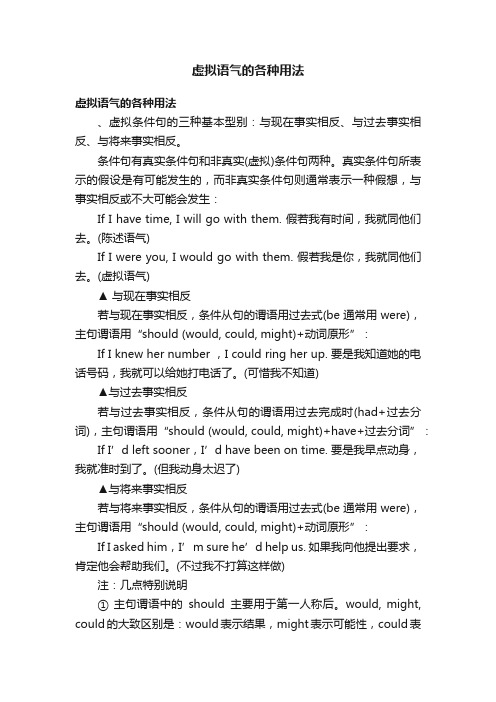
虚拟语气的各种用法虚拟语气的各种用法、虚拟条件句的三种基本型别:与现在事实相反、与过去事实相反、与将来事实相反。
条件句有真实条件句和非真实(虚拟)条件句两种。
真实条件句所表示的假设是有可能发生的,而非真实条件句则通常表示一种假想,与事实相反或不大可能会发生:If I have time, I will go with them. 假若我有时间,我就同他们去。
(陈述语气)If I were you, I would go with them. 假若我是你,我就同他们去。
(虚拟语气)▲ 与现在事实相反若与现在事实相反,条件从句的谓语用过去式(be通常用were),主句谓语用“should (would, could, might)+动词原形”:If I knew her number ,I could ring her up. 要是我知道她的电话号码,我就可以给她打电话了。
(可惜我不知道)▲与过去事实相反若与过去事实相反,条件从句的谓语用过去完成时(had+过去分词),主句谓语用“should (would, could, might)+have+过去分词”:If I’d left sooner,I’d have been on time. 要是我早点动身,我就准时到了。
(但我动身太迟了)▲与将来事实相反若与将来事实相反,条件从句的谓语用过去式(be通常用were),主句谓语用“should (would, could, might)+动词原形”:If I asked him,I’m sure he’d help us. 如果我向他提出要求,肯定他会帮助我们。
(不过我不打算这样做)注:几点特别说明① 主句谓语中的should主要用于第一人称后。
would, might, could的大致区别是:would表示结果,might表示可能性,could表示能力、允许或可能性。
比较:If you tried again ,you would sueed. 要是你再试一试,你就会成功的。
英语虚拟语气讲解(高中)
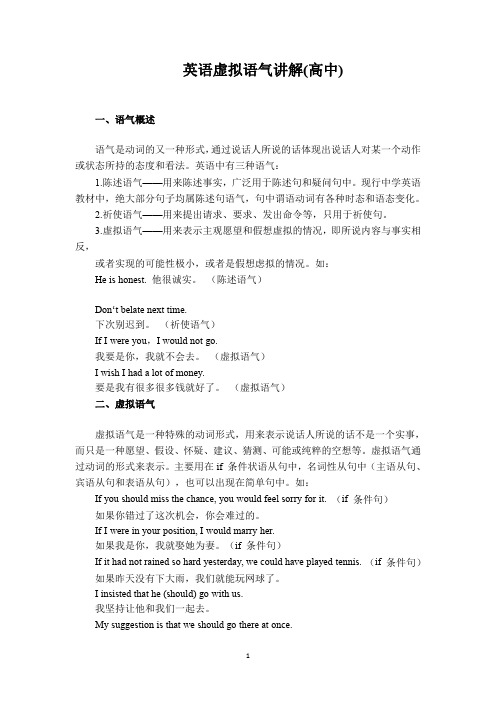
英语虚拟语气讲解(高中)一、语气概述语气是动词的又一种形式,通过说话人所说的话体现出说话人对某一个动作或状态所持的态度和看法。
英语中有三种语气:1.陈述语气——用来陈述事实,广泛用于陈述句和疑问句中。
现行中学英语教材中,绝大部分句子均属陈述句语气,句中谓语动词有各种时态和语态变化。
2.祈使语气——用来提出请求、要求、发出命令等,只用于祈使句。
3.虚拟语气——用来表示主观愿望和假想虚拟的情况,即所说内容与事实相反,或者实现的可能性极小,或者是假想虑拟的情况。
如:He is honest.他很诚实。
(陈述语气)Don‘t belate next time.下次别迟到。
(祈使语气)If I were you,I would not go.我要是你,我就不会去。
(虚拟语气)I wish I had a lot of money.要是我有很多很多钱就好了。
(虚拟语气)二、虚拟语气虚拟语气是一种特殊的动词形式,用来表示说话人所说的话不是一个实事,而只是一种愿望、假设、怀疑、建议、猜测、可能或纯粹的空想等。
虚拟语气通过动词的形式来表示。
主要用在if条件状语从句中,名词性从句中(主语从句、宾语从句和表语从句),也可以出现在简单句中。
如:If you should miss the chance,you would feel sorry for it.(if条件句)如果你错过了这次机会,你会难过的。
If I were in your position,I would marry her.如果我是你,我就娶她为妻。
(if条件句)If it had not rained so hard yesterday,we could have played tennis.(if条件句)如果昨天没有下大雨,我们就能玩网球了。
I insisted that he(should)go with us.我坚持让他和我们一起去。
My suggestion is that we should go there at once.我的建议是我们应该马上去那儿。
Book6Unit1虚拟语气
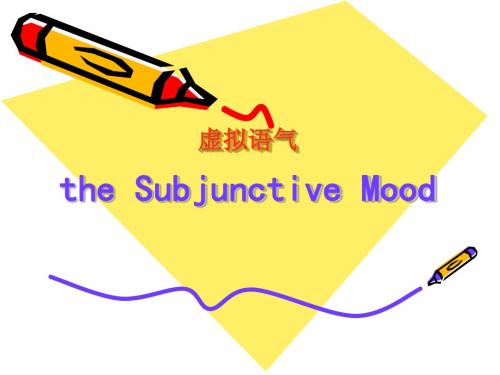
典型例题: 典型例题:区别陈述语气与虚拟语气
1) The volleyball match will be put off if it _____. B A. will rain B. rains C. rained D. is rained
该句为陈述语气, 该句为陈述语气,因为主句用的是 will be put off。真实条 陈述语气 。 件句主句为将来时,从句用一般现在时代将来时。 件句主句为将来时,从句用一般现在时代将来时。
5、含蓄条件句:句中没有明显的虚拟条件句,而是利用某 、含蓄条件句:句中没有明显的虚拟条件句, 他手段或方式来暗示存在虚拟条件。 他手段或方式来暗示存在虚拟条件。其虚拟的结构形式通过 主句来表现。常用来表示含蓄虚拟条件的方式有: 主句来表现。常用来表示含蓄虚拟条件的方式有:
4.其它形式的条件虚拟句 其它形式的条件虚拟句 1)Supposing/suppose =if(用法与 虚拟条件句相同) ) (用法与if 虚拟条件句相同) 2)If it were not for + 名词短语 主句(时态与现在或将 名词短语+ 主句( ) 来事实相反) 来事实相反) 3)If it had not been for + 名词短语 主句(时态与过去事 名词短语+ 主句( ) 实相反) 实相反) Suppose (supposing) your friends knew how you are behaving here, what would they think? If it had not been for your help, we would not have achieved so much in our work. If it were not for the wise decision, we could not be living a happy life.
选修6 Unit 1虚拟语气
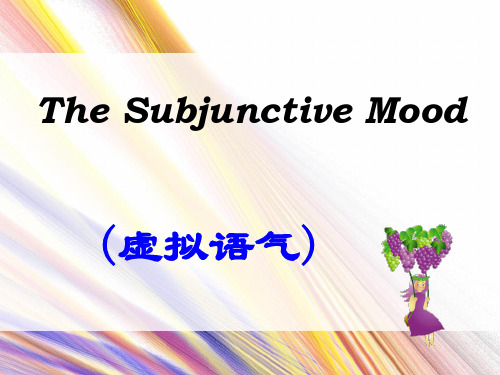
(虚拟语气)
英语中有三种语气:
陈述语气,祈使语气和虚拟语气
陈述语气:用来陈述一个事实,或提出一种看法。有 肯定、否定、疑问和感叹等形式。 祈使语气:用来表示请求、邀请、命令、警告或劝告 等。 虚拟语气:表示说话人所说的话不是事实,而是一种 假设、愿望、怀疑、猜测或建议。主要用在if条件状 语从句中;也可用在宾语从句、表语从句、同位语从 句中。
If he __________(drive) more had driven would not have had carefully, he _________________ (have) the car accident yesterday.
PRACTICE 2: Fill in the blanks.
He would pass the test if he had taken my advice.
★假如昨天我对他说了, 现在我就知道该怎么
办了。 If I had spoken to him yesterday, I should know
反
did should do might/should would/could+ were to do
与过去愿望相反: had done
I wish I had seen that film. 与现在愿望相反: did/were
I wish
I wish I were as handsome as you. would/could 与将来愿望相反:/might+动词 原形 I wish I would try again.
would/could/ If he had studied harder, he should might would have entered our have done school. If he should not come tomorrow, we would put off the meeting till next week
高中英语句子翻译与写作-第6章-虚拟语气
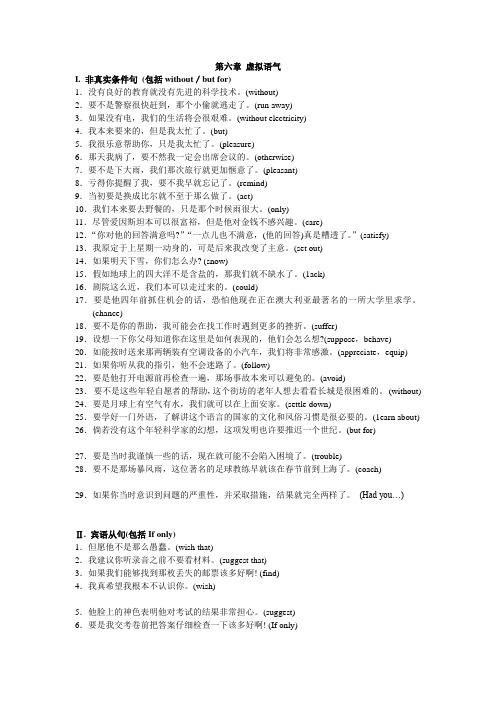
第六章虚拟语气I. 非真实条件句(包括without/but for)1.没有良好的教育就没有先进的科学技术。
(without)2.要不是警察很快赶到,那个小偷就逃走了。
(run away)3.如果没有电,我们的生活将会很艰难。
(without electricity)4.我本来要来的,但是我太忙了。
(but)5.我很乐意帮助你,只是我太忙了。
(pleasure)6.那天我病了,要不然我一定会出席会议的。
(otherwise)7.要不是下大雨,我们那次旅行就更加惬意了。
(pleasant)8.亏得你提醒了我,要不我早就忘记了。
(remind)9.当初要是换成比尔就不至于那么做了。
(act)10.我们本来要去野餐的,只是那个时候雨很大。
(only)11.尽管爱因斯坦本可以很富裕,但是他对金钱不感兴趣。
(care)12.“你对他的回答满意吗?”“一点儿也不满意,(他的回答)真是糟透了。
”(satisfy)13.我原定于上星期一动身的,可是后来我改变了主意。
(set out)14.如果明天下雪,你们怎么办? (snow)15.假如地球上的四大洋不是含盐的,那我们就不缺水了。
(1ack)16.剧院这么近,我们本可以走过来的。
(could)17.要是他四年前抓住机会的话,恐怕他现在正在澳大利亚最著名的一所大学里求学。
(chance)18.要不是你的帮助,我可能会在找工作时遇到更多的挫折。
(suffer)19.设想一下你父母知道你在这里是如何表现的,他们会怎么想?(suppose,behave) 20.如能按时送来那两辆装有空调设备的小汽车,我们将非常感激。
(appreciate,equip) 21.如果你听从我的指引,他不会迷路了。
(follow)22.要是他打开电源前再检查一遍,那场事故本来可以避免的。
(avoid)23.要不是这些年轻自愿者的帮助,这个街坊的老年人想去看看长城是很困难的。
(without) 24.要是月球上有空气有水,我们就可以在上面安家。
高中英语 Module 6 War and Peace Section Ⅱ Grammar—虚拟语气

Module 6 War and Peace Section ⅡGrammar——虚拟语气(2) [语法图解][课文原句感知]①I wish I knew the answer to the question at the moment.②We wish we had studied harder when at school.③I wish I could fly to the moon one day.④I'd rather you paid the money yourself.⑤I'd rather she hadn't done that then.⑥The workers demanded that their wages (should) be increased.⑦The boss ordered the stuff that they (should) finish the task before this Friday.⑧He gave the advice that we (should) do the work carefully.⑨My suggestion is that we (should) think it over before accepting it.⑩It is important that students (should) attend all the lectures.[语法领悟](1)由①②③句可知,wish 后接宾语从句,从句谓语动词需用虚拟语气。
用一般过去时表示与现在相反的情况,用过去完成时表示与过去相反的情况,用“would/c ould/might+动词原形〞表示与将来相反的情况。
(2)④⑤句中,would rather 后接宾语从句,从句谓语动词需用虚拟语气。
用一般过去时表示现在或将来的愿望,用过去完成时表示过去的愿望。
- 1、下载文档前请自行甄别文档内容的完整性,平台不提供额外的编辑、内容补充、找答案等附加服务。
- 2、"仅部分预览"的文档,不可在线预览部分如存在完整性等问题,可反馈申请退款(可完整预览的文档不适用该条件!)。
- 3、如文档侵犯您的权益,请联系客服反馈,我们会尽快为您处理(人工客服工作时间:9:00-18:30)。
第六章虚拟语气
I. 非真实条件句(包括without/but for)
1.没有良好的教育就没有先进的科学技术。
(without)
2.要不是警察很快赶到,那个小偷就逃走了。
(run away)
3.如果没有电,我们的生活将会很艰难。
(without electricity)
4.我本来要来的,但是我太忙了。
(but)
5.我很乐意帮助你,只是我太忙了。
(pleasure)
6.那天我病了,要不然我一定会出席会议的。
(otherwise)
7.要不是下大雨,我们那次旅行就更加惬意了。
(pleasant)
8.亏得你提醒了我,要不我早就忘记了。
(remind)
9.当初要是换成比尔就不至于那么做了。
(act)
10.我们本来要去野餐的,只是那个时候雨很大。
(only)
11.尽管爱因斯坦本可以很富裕,但是他对金钱不感兴趣。
(care)
12.“你对他的回答满意吗?”“一点儿也不满意,(他的回答)真是糟透了。
”(satisfy)
13.我原定于上星期一动身的,可是后来我改变了主意。
(set out)
14.如果明天下雪,你们怎么办? (snow)
15.假如地球上的四大洋不是含盐的,那我们就不缺水了。
(1ack)
16.剧院这么近,我们本可以走过来的。
(could)
17.要是他四年前抓住机会的话,恐怕他现在正在澳大利亚最著名的一所大学里求学。
(chance)
18.要不是你的帮助,我可能会在找工作时遇到更多的挫折。
(suffer)
19.设想一下你父母知道你在这里是如何表现的,他们会怎么想?(suppose,behave) 20.如能按时送来那两辆装有空调设备的小汽车,我们将非常感激。
(appreciate,equip) 21.如果你听从我的指引,他不会迷路了。
(follow)
22.要是他打开电源前再检查一遍,那场事故本来可以避免的。
(avoid)
23.要不是这些年轻自愿者的帮助,这个街坊的老年人想去看看长城是很困难的。
(without) 24.要是月球上有空气有水,我们就可以在上面安家。
(settle down)
25.要学好一门外语,了解讲这个语言的国家的文化和风俗习惯是很必要的。
(1earn about) 26.倘若没有这个年轻科学家的幻想,这项发明也许要推迟一个世纪。
(but for)
27.要是当时我谨慎一些的话,现在就可能不会陷入困境了。
(trouble)
28.要不是那场暴风雨,这位著名的足球教练早就该在春节前到上海了。
(coach)
29.如果你当时意识到问题的严重性,并采取措施,结果就完全两样了。
(Had you…)
Ⅱ. 宾语从句(包括If only)
1.但愿他不是那么愚蠢。
(wish that)
2.我建议你听录音之前不要看材料。
(suggest that)
3.如果我们能够找到那枚丢失的邮票该多好啊! (find)
4.我真希望我根本不认识你。
(wish)
5.他脸上的神色表明他对考试的结果非常担心。
(suggest)
6.要是我交考卷前把答案仔细检查一下该多好啊! (If only)
7.我天天忙得不可开交,我多么希望一天有26个小时,甚至30小时啊! (engage)
8.专家们建议污水净化以后才能排入河流、湖泊。
(make clean)
9.绿茶含有很多有益于人体的物质,我建议你每天喝。
(benefit)
10.许多专家建议应该对上海的高楼数量进行限制。
(propose)
11.我建议你在做功课前先复习一下课文,这样你可以避免犯许多错误。
(avoid) 12.他们要求必须考虑一切可能的问题。
(take into)
13.有些人坚持认为温室效应不会给人类带来什么影响。
(effect)
14.我母亲建议我提前回家。
(suggest)
15.我建议你在参加考试前,把这些课文复习一下。
(take)
16.但愿当时我采纳了你的建议。
(If only)
17.我真希望我的英语说得和他一样流利。
(wish)
III.主语从句
1.农民有必要在耕作中使用人工化肥吗? (necessary)
2.每天匀出一些时间复习学过的知识是相当必要的。
(It is necessary that)
3.要自学好一门外语,最重要的是要有毅力。
(if)
IV.表语从句
1.但愿我会飞就好了。
(wish n.)。
